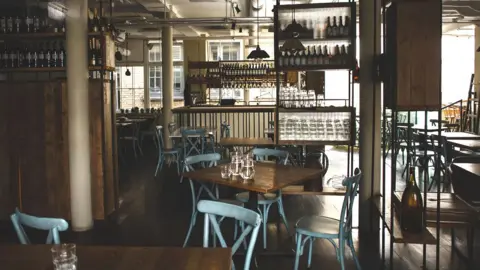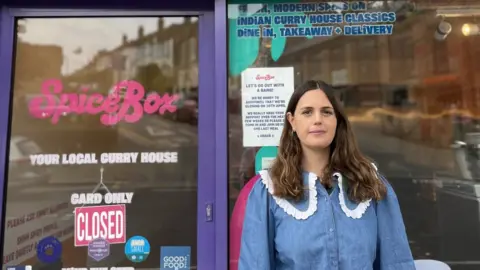London still losing pubs and restaurants post-pandemic - research
 NurPhoto/Getty
NurPhoto/GettyA higher proportion of pubs, bars, restaurants and nightclubs have closed in central London than in most other British cities since the pandemic, according to new research.
Data from consultants CGA and AlixPartners suggests the number of licensed premises since March 2020 declined 12% in British cities.
However, in central London it fell 15.6%, the third highest percentage.
This is equivalent to 540 closures, or one every two days.
Even in the most recent quarter from December 2022 to March 2023, the number of venues in central London dropped by a further 1%.
The cost-of-living crisis has also affected other hospitality businesses, including some big chains.
Italian restaurant chain Prezzo announced it would shut a third of its restaurants after being hit by rising costs for pizza and pasta ingredients and energy.
Karl Chessell, director of CGA, said: "The pandemic had a devastating impact on the hospitality sector and London was hit particularly hard with a reliance on office workers and tourists to help drive sales."
But Mr Chessell said the good news was that "consumers continue to eat and drink out and hospitality is seen as an affordable treat that consumers want to prioritise".
Among London businesses struggling is Spice Box, which started seven years ago as a street food stall before its owner, Grace Regan, opened two restaurants in east London.
However, she had to close her Leytonstone venue last year, and on the night I visited her she was closing her Walthamstow restaurant too.
No choice left
"It's a really emotional day," she said, adding that the rising cost of living was making the business "unviable".
"Since Covid, we've seen about a 30% reduction in revenue… and on top of that I've seen a 15% increase in the cost of goods - that's food, takeaway packaging, drinks and energy of course - that's all impacting," she continued.
She said this drop in customers, teamed with rising costs, had left her no choice but to close up.

Adrian Mills, who runs Thai Tho in the heart of Soho in central London, says customers are still coming in but are more cautious about what they order.
"We have noticed that in this restaurant, [customers] have one glass, not one bottle of wine. They will miss out on a starter, they will miss out on dessert, they've scaled back on their spend," he said.
He says he has "sleepless nights worrying" - partly because the amount business spends on oil, meat and other produce is up 25-30% and wage bills are higher; as are rents.
"We were paying £27,000 per year for electric, that's now £70,000," he added.
'Never known a harder time'
After VAT, business rates and other bills, it's also much harder to make a profit and Mr Mills said the break-even point for the restaurant was now about £20,000 a week.
"I've been involved in hospitality and in 30 years we've never known a harder, more difficult time. People will survive, but there will be hundreds of casualties going forward," he added.
Back in Walthamstow, Ms Regan says she has lots of friends in the industry who are struggling: "I don't know anyone that's not on the brink of having to close down their business."
She's now selling her curries and dahls in retail pouches and hopes to get them into supermarkets, but her restaurants have become the latest of many shutting their doors in the capital.

Follow BBC London on Facebook, Twitter and Instagram. Send your story ideas to [email protected]
